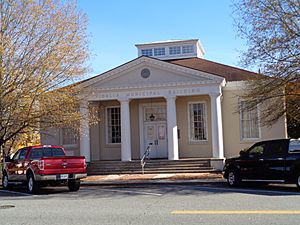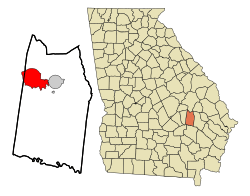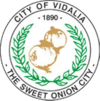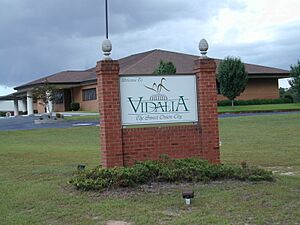Vidalia, Georgia facts for kids
Quick facts for kids
Vidalia, Georgia
|
|||
|---|---|---|---|
| City of Vidalia | |||

Vidalia Municipal Building (2015)
|
|||
|
|||
| Motto(s):
"The Sweet Onion City"
|
|||

Location in Toombs County and the U.S. state of Georgia
|
|||
| Country | United States | ||
| State | Georgia | ||
| Counties | Toombs, Montgomery | ||
| Area | |||
| • City | 18.26 sq mi (47.29 km2) | ||
| • Land | 17.89 sq mi (46.33 km2) | ||
| • Water | 0.37 sq mi (0.96 km2) | ||
| Elevation | 299 ft (91 m) | ||
| Population
(2020)
|
|||
| • City | 10,785 | ||
| • Density | 602.88/sq mi (232.77/km2) | ||
| • Metro | 35,640 | ||
| Time zone | UTC-5 (Eastern (EST)) | ||
| • Summer (DST) | UTC-4 (EDT) | ||
| ZIP codes |
30474-30475
|
||
| Area code(s) | 912 | ||
| FIPS code | 13-79388 | ||
| GNIS feature ID | 0324704 | ||
Vidalia (pronounced vye-DAYL-yuh) is a city in Georgia, United States. Most of the city is in Toombs County, but a small part extends into Montgomery County. In 2020, about 10,785 people lived there.
Vidalia is the main city in the Vidalia Micropolitan Statistical Area. This area includes Montgomery and Toombs counties. In 2020, about 35,640 people lived in this larger area.
Contents
History of Vidalia
Vidalia became an official city on January 1, 1890. It is the biggest city in Toombs County. However, it is not the county seat, which is the main town for county government. The city was first called "Jenkins Station" after a local landowner. The name "Vidalia" likely came from a daughter of Samuel Hawkins. He was the president of a railroad company.
Like many towns in this area, Vidalia grew because of its rail yard. This rail yard helped farmers send their crops to other places. Farmers grew things like pecans and tobacco. The famous Vidalia onions became an important crop much later.
From 1952 to 1956, Vidalia had its own minor league baseball team. They were called the Vidalia Indians. They even won the league championship in 1953.
In the 1950s, a large grocery store company opened a distribution center in Vidalia. This brought many new jobs and more railroad business. Today, other companies use parts of this old distribution center.
Where is Vidalia?
Vidalia is in the northwestern part of Toombs County. A small section is in northeastern Montgomery County. You can find it at 32°12′55″N 82°24′36″W / 32.21528°N 82.41000°W.
The city is located along U.S. Route 280. This highway goes through the middle of town. U.S. 280 goes east about 6 miles to Lyons. Lyons is the county seat for Toombs County. The highway also goes southwest about 12 miles to Mount Vernon. Mount Vernon is the county seat for Montgomery County. Other highways also pass through Vidalia.
Vidalia covers about 18.3 square miles (47.4 square kilometers). Most of this area is land. About 0.4 square miles (1 square kilometer) is water. Rocky Creek and Swift Creek flow through the city. They both lead to the Ohoopee River.
People of Vidalia
| Historical population | |||
|---|---|---|---|
| Census | Pop. | %± | |
| 1900 | 503 | — | |
| 1910 | 1,776 | 253.1% | |
| 1920 | 2,860 | 61.0% | |
| 1930 | 3,585 | 25.3% | |
| 1940 | 4,109 | 14.6% | |
| 1950 | 5,819 | 41.6% | |
| 1960 | 7,569 | 30.1% | |
| 1970 | 9,507 | 25.6% | |
| 1980 | 10,393 | 9.3% | |
| 1990 | 11,078 | 6.6% | |
| 2000 | 10,491 | −5.3% | |
| 2010 | 10,473 | −0.2% | |
| 2020 | 10,785 | 3.0% | |
| U.S. Decennial Census | |||
| Group | Number | Percent |
|---|---|---|
| White (not Hispanic) | 5,168 | 47.92% |
| Black or African American (not Hispanic) | 4,556 | 42.24% |
| Native American | 16 | 0.15% |
| Asian | 152 | 1.41% |
| Pacific Islander | 2 | 0.02% |
| Other/Mixed | 296 | 2.74% |
| Hispanic or Latino | 595 | 5.52% |
In 2020, there were 10,785 people living in Vidalia. There were 4,042 households and 2,499 families.
Vidalia's Economy
Vidalia has a mix of different businesses. However, its biggest industry is farming. Since 1931, a special type of onion called the Granex onion has been grown here. These onions are sold all over the world as Vidalia onions.
In 1986, a law was passed to protect the Vidalia onion name. This meant only onions grown in the Vidalia and Toombs County area could be called Vidalia onions. Later, in 1989, a federal rule gave growers and sellers the right to create the Vidalia Onion Committee. This group helps protect the onion's name and how it is grown.
The Famous Vidalia Onions
Vidalia is most famous for its "sweet" onions. The Vidalia onion was first grown around 1931. A farmer named Mose Coleman found that his onions were much sweeter than others. Soon, other farmers started growing them too. By the 1940s, Vidalia onions became a popular item for tourists to buy.
Growers have worked hard to protect their special onion. Today, any onion called "Vidalia" must be grown in one of thirteen counties in Georgia. It can also be grown in specific parts of seven other counties. Because they taste so good and have a great reputation, these onions can be sold for a higher price.
In 1990, the Vidalia onion was named the official vegetable of the state of Georgia!
Fun Things to Do in Vidalia
Annual Events
Every spring, Vidalia hosts a famous Vidalia Onion Festival. This event lasts for five days. It brings in many visitors with its fun activities.
Museums and Places to Visit
The Altama Gallery is a museum of history and art. It is located inside a beautifully restored old house called the Brazell House.
The Vidalia Onion Museum offers a fun and interactive look at history. This museum is 1,300 square feet. It has many exhibits that show how important the sweet onion is to the area. You can learn about its history, culture, and how it's used in cooking. The museum is located at 100 Vidalia Sweet Onion Drive.
Schools in Vidalia
Public Schools
Vidalia has its own public school system. It includes schools for students from pre-school all the way to twelfth grade. The district has two elementary schools, one middle school, and one high school. There are over 144 full-time teachers and more than 2,408 students.
- J.D. Dickerson Primary School
- Sally Dailey Meadows Elementary School
- J.R. Trippe Middle School
- Vidalia Comprehensive High School
- Edward D Phillips Special Education Center
Private Schools
- The Paul Anderson Youth Home helps young people who are facing challenges. It offers a faith-based education and support.
- Vidalia Heritage Academy teaches students from preschool through high school. It focuses on building good character and strong academics in a Christian setting.
Famous People from Vidalia
- Paul Anderson: An Olympic weightlifter and strongman. He started the Paul Anderson Youth Home in Vidalia.
- Mel Blount: A former football player for the Pittsburgh Steelers. He was a five-time Pro Bowler and is in the Pro Football Hall of Fame. He was born in Vidalia.
- Paul Claxton: A professional golfer who was born in Vidalia.
- Don Harris: An NBC News reporter who was born in Vidalia.
- Carl Simpson: A football player who was born in Vidalia.
- Fred Stokes: A football player who played for ten seasons in the National Football League. He was born in Vidalia.
Images for kids
See also
 In Spanish: Vidalia (Georgia) para niños
In Spanish: Vidalia (Georgia) para niños





